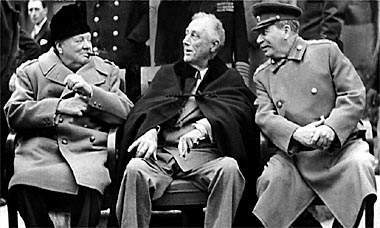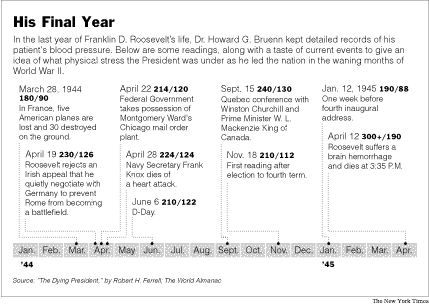
Photo from the Yalta Conference: Winston S. Churchill, Franklin D. Roosevelt and Stalin
When Roosevelt returned to America, he said that he was extremely pleased with the results of the conference. He felt that he had struck a good deal with "Uncle Joe Stalin", as Roosevelt fondly called him.
It is not clear why Roosevelt thought he had made such a good deal. The agreement clearly gave Stalin the whole of Eastern Europe plus certain Japanese islands. In return, Stalin had to do nothing at all. For example, the agreement called for Stalin to enter the War with Japan. However, the Soviet Union did not declare war on Japan until several days after the US had dropped the A-bomb on Japan, effectively ending the war. Thus, Stalin got the Kurile Islands from Japan for free.
 Photo from the Yalta Conference: Winston S. Churchill, Franklin D. Roosevelt and Stalin |
In fact, when a person shoots himself in the head, what he dies of is a "brain hemorrhage".
When I first heard this rumor from an elderly lady that Roosevelt had actually killed himself, I did not believe it, as this possibility is never mentioned in any history book.
However, I asked around and every old person I could find, old enough to be able to remember when Roosevelt died, believed or at least had heard the rumor that Roosevelt had killed himself. One reason often cited for this belief was that they did not open the casket and show his body before they buried him.
Why would the President of America and one of the most powerful men in the world kill himself?
There are several possible reasons: Franklin D. Roosevelt was crippled from polio, a fact kept secret from the American people until after his death. He could not leave his wheel chair. Reports from the Yalta Conference said that he was so tired from the deliberations that he could not stand up. In reality, he had not stood up in more than twenty years!
Perhaps Roosevelt killed himself because he realized the terrible error he had made at Yalta. The long suffering people of Eastern Europe had fought and so many of them had died to escape Hitler, and then Roosevelt without even consulting them had given them to Stalin.

One person who believed that Roosevelt likely killed himself was my uncle, Newell Jacobson, who saw heavy combat during World War II. Newell did not participate in the Normandy Invasion, but he joined the forces on the front lines one-third of the way into France. Newell Jacobson was a liaison officer in the Tank Corps in the Battle of the Bulge and in the final campaign into Germany.
After the war, Newell spent the rest of his life telling war stories. He told the same stories over and over again. His wife, Dorothy, reported that he often had nightmares about the war and woke up in the night.
One story he often told was about how, near the end of the war, he and another officer took a leisurely stroll. When they got not far away from their camp, 27 German soldiers jumped out behind trees and rocks with their hands up, offering to surrender. Newell and his fellow officer rounded them up and were escorting them back, when the Germans informed them of some other soldiers who wanted to surrender too. Newell and his companion collected the entire brigade and brought them all back as prisoners. Newell received a medal for this.
Another story he told involved a situation where the opposing forces were facing each other and there was a no-man's land in between. For some reason, there was an object in that no-man's land which needed to be retrieved. It was Newell's assignment to retrieve it.
Newell figured that if he ran out as fast as he could, tried to pick it up and run back, the Germans would shoot him.
Therefore, he simply casually walked out, picked up the object, and walked back with it. The Germans did not shoot at him, although they easily could have done so.
Newell said that the US forces could easily have taken Berlin two weeks before they did. However, the US forces were under orders not to take Berlin by themselves, but to wait for the Russians to arrive so that the Allies and the Russians would all enter Berlin at the same time. As a result, the US troops sat still and waited for the Russians.
This was part of the deal which Roosevelt had made with Stalin at Yalta to divide Europe. Because of this deal, millions of Eastern Europeans were to spend the next 45 years in slavery.
Sam Sloan